Report on Entrepreneurship and Small Business Management Module
VerifiedAdded on 2020/06/03
|9
|3930
|60
Report
AI Summary
This report delves into the multifaceted world of entrepreneurship and small business management. It begins by exploring various types of entrepreneurial ventures, including small-scale enterprises, scalable businesses, large industries, and social entrepreneurship, highlighting their relationships to entrepreneurship typology. The report then examines the similarities and differences among these ventures, emphasizing the role of the entrepreneur's vision and values. Furthermore, it assesses the significant impact of small and micro businesses on the economy, detailing their contributions to economic power, growth, and innovation. The report also discusses how these businesses contribute to the social economy and their adaptability to changing economic climates. Finally, it outlines the key characteristics, traits, and skills of a successful entrepreneur, emphasizing the importance of passion, risk-taking, self-belief, adaptability, and money management in driving entrepreneurial success.

ENTREPRENEURSHIP AND SMALL
BUSINESS MANAGEMENT
BUSINESS MANAGEMENT
Paraphrase This Document
Need a fresh take? Get an instant paraphrase of this document with our AI Paraphraser
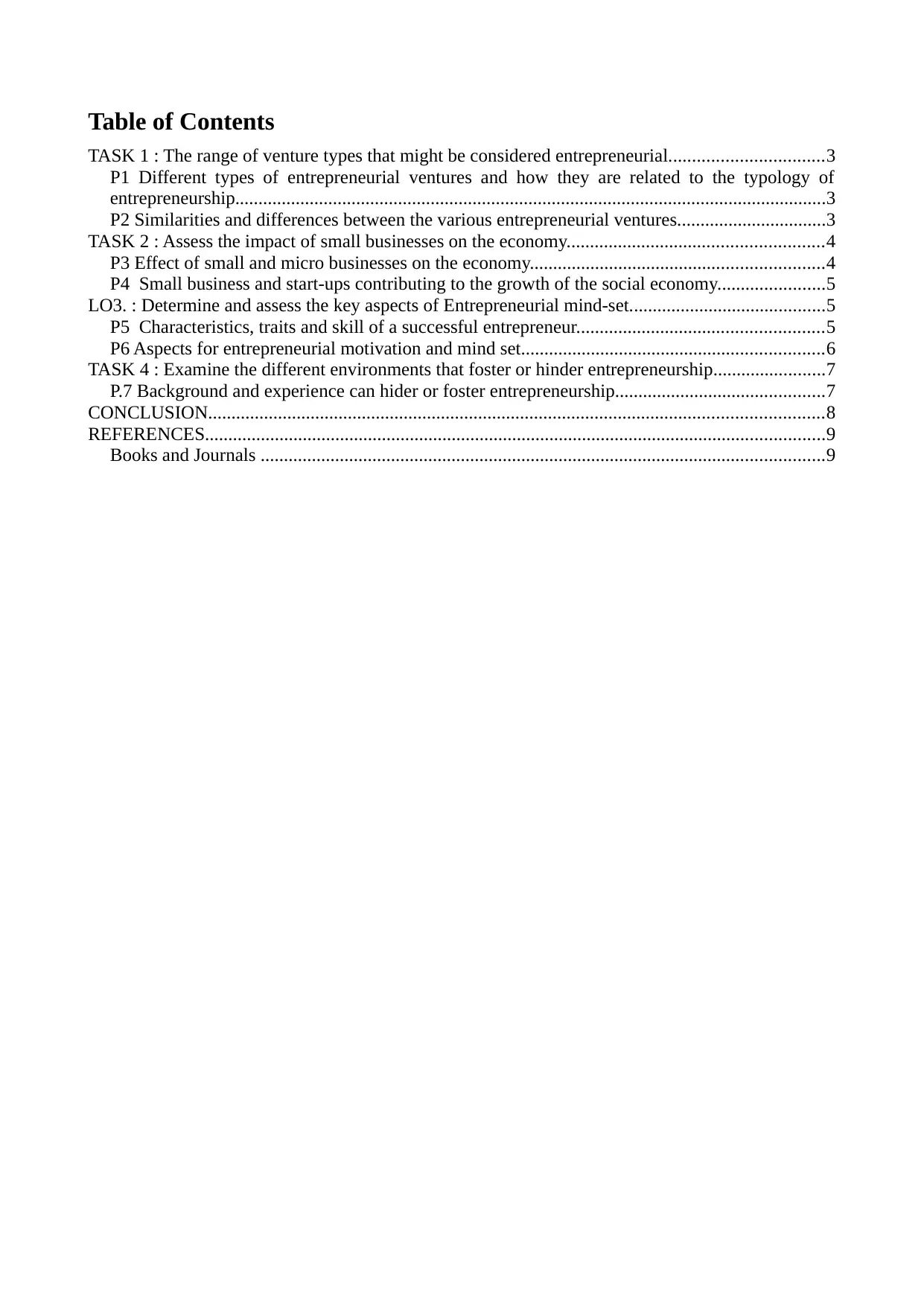
Table of Contents
TASK 1 : The range of venture types that might be considered entrepreneurial.................................3
P1 Different types of entrepreneurial ventures and how they are related to the typology of
entrepreneurship...............................................................................................................................3
P2 Similarities and differences between the various entrepreneurial ventures................................3
TASK 2 : Assess the impact of small businesses on the economy.......................................................4
P3 Effect of small and micro businesses on the economy...............................................................4
P4 Small business and start-ups contributing to the growth of the social economy.......................5
LO3. : Determine and assess the key aspects of Entrepreneurial mind-set..........................................5
P5 Characteristics, traits and skill of a successful entrepreneur.....................................................5
P6 Aspects for entrepreneurial motivation and mind set.................................................................6
TASK 4 : Examine the different environments that foster or hinder entrepreneurship........................7
P.7 Background and experience can hider or foster entrepreneurship.............................................7
CONCLUSION....................................................................................................................................8
REFERENCES.....................................................................................................................................9
Books and Journals .........................................................................................................................9
TASK 1 : The range of venture types that might be considered entrepreneurial.................................3
P1 Different types of entrepreneurial ventures and how they are related to the typology of
entrepreneurship...............................................................................................................................3
P2 Similarities and differences between the various entrepreneurial ventures................................3
TASK 2 : Assess the impact of small businesses on the economy.......................................................4
P3 Effect of small and micro businesses on the economy...............................................................4
P4 Small business and start-ups contributing to the growth of the social economy.......................5
LO3. : Determine and assess the key aspects of Entrepreneurial mind-set..........................................5
P5 Characteristics, traits and skill of a successful entrepreneur.....................................................5
P6 Aspects for entrepreneurial motivation and mind set.................................................................6
TASK 4 : Examine the different environments that foster or hinder entrepreneurship........................7
P.7 Background and experience can hider or foster entrepreneurship.............................................7
CONCLUSION....................................................................................................................................8
REFERENCES.....................................................................................................................................9
Books and Journals .........................................................................................................................9
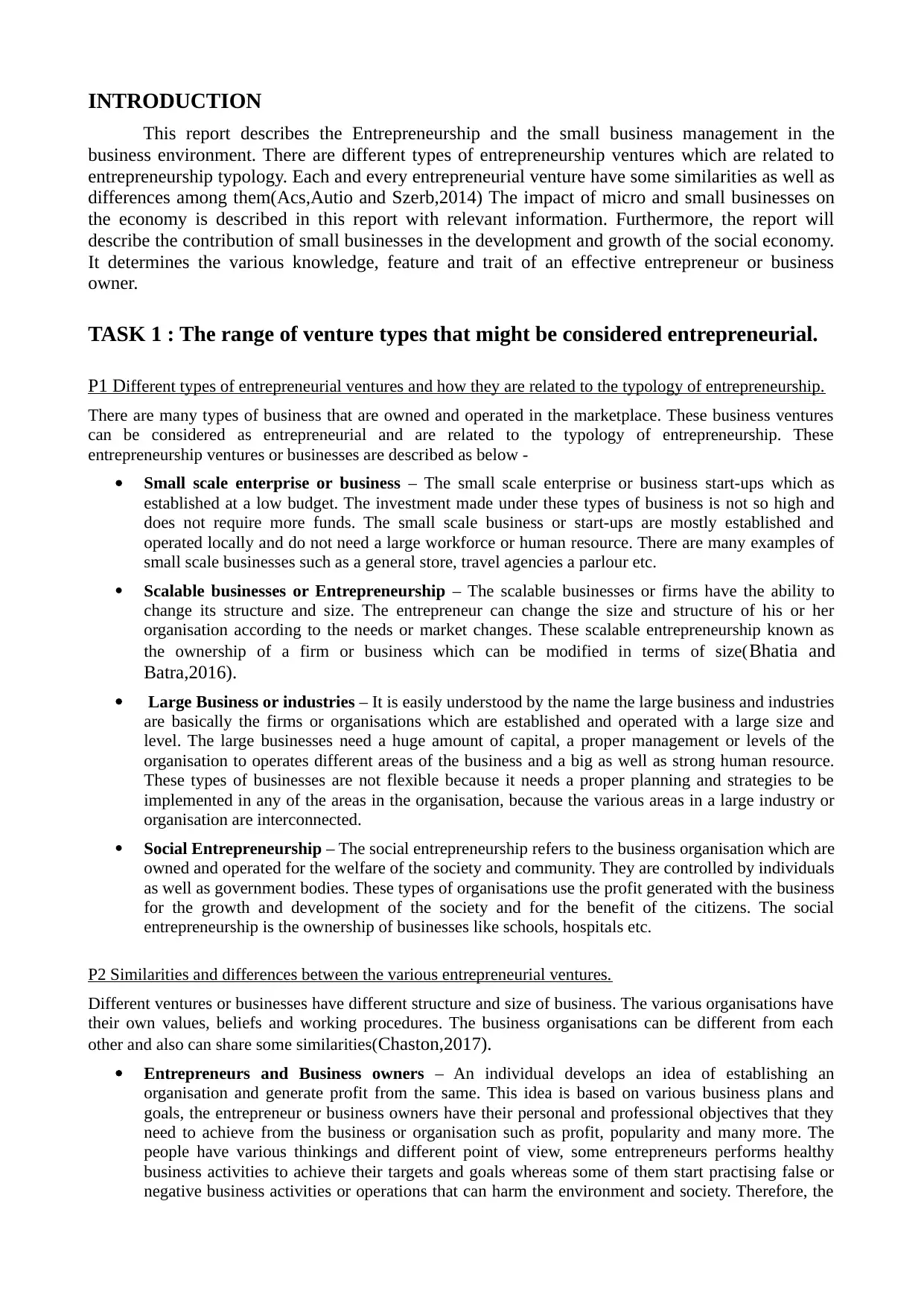
INTRODUCTION
This report describes the Entrepreneurship and the small business management in the
business environment. There are different types of entrepreneurship ventures which are related to
entrepreneurship typology. Each and every entrepreneurial venture have some similarities as well as
differences among them(Acs,Autio and Szerb,2014) The impact of micro and small businesses on
the economy is described in this report with relevant information. Furthermore, the report will
describe the contribution of small businesses in the development and growth of the social economy.
It determines the various knowledge, feature and trait of an effective entrepreneur or business
owner.
TASK 1 : The range of venture types that might be considered entrepreneurial.
P1 Different types of entrepreneurial ventures and how they are related to the typology of entrepreneurship.
There are many types of business that are owned and operated in the marketplace. These business ventures
can be considered as entrepreneurial and are related to the typology of entrepreneurship. These
entrepreneurship ventures or businesses are described as below -
Small scale enterprise or business – The small scale enterprise or business start-ups which as
established at a low budget. The investment made under these types of business is not so high and
does not require more funds. The small scale business or start-ups are mostly established and
operated locally and do not need a large workforce or human resource. There are many examples of
small scale businesses such as a general store, travel agencies a parlour etc.
Scalable businesses or Entrepreneurship – The scalable businesses or firms have the ability to
change its structure and size. The entrepreneur can change the size and structure of his or her
organisation according to the needs or market changes. These scalable entrepreneurship known as
the ownership of a firm or business which can be modified in terms of size(Bhatia and
Batra,2016).
Large Business or industries – It is easily understood by the name the large business and industries
are basically the firms or organisations which are established and operated with a large size and
level. The large businesses need a huge amount of capital, a proper management or levels of the
organisation to operates different areas of the business and a big as well as strong human resource.
These types of businesses are not flexible because it needs a proper planning and strategies to be
implemented in any of the areas in the organisation, because the various areas in a large industry or
organisation are interconnected.
Social Entrepreneurship – The social entrepreneurship refers to the business organisation which are
owned and operated for the welfare of the society and community. They are controlled by individuals
as well as government bodies. These types of organisations use the profit generated with the business
for the growth and development of the society and for the benefit of the citizens. The social
entrepreneurship is the ownership of businesses like schools, hospitals etc.
P2 Similarities and differences between the various entrepreneurial ventures.
Different ventures or businesses have different structure and size of business. The various organisations have
their own values, beliefs and working procedures. The business organisations can be different from each
other and also can share some similarities(Chaston,2017).
Entrepreneurs and Business owners – An individual develops an idea of establishing an
organisation and generate profit from the same. This idea is based on various business plans and
goals, the entrepreneur or business owners have their personal and professional objectives that they
need to achieve from the business or organisation such as profit, popularity and many more. The
people have various thinkings and different point of view, some entrepreneurs performs healthy
business activities to achieve their targets and goals whereas some of them start practising false or
negative business activities or operations that can harm the environment and society. Therefore, the
This report describes the Entrepreneurship and the small business management in the
business environment. There are different types of entrepreneurship ventures which are related to
entrepreneurship typology. Each and every entrepreneurial venture have some similarities as well as
differences among them(Acs,Autio and Szerb,2014) The impact of micro and small businesses on
the economy is described in this report with relevant information. Furthermore, the report will
describe the contribution of small businesses in the development and growth of the social economy.
It determines the various knowledge, feature and trait of an effective entrepreneur or business
owner.
TASK 1 : The range of venture types that might be considered entrepreneurial.
P1 Different types of entrepreneurial ventures and how they are related to the typology of entrepreneurship.
There are many types of business that are owned and operated in the marketplace. These business ventures
can be considered as entrepreneurial and are related to the typology of entrepreneurship. These
entrepreneurship ventures or businesses are described as below -
Small scale enterprise or business – The small scale enterprise or business start-ups which as
established at a low budget. The investment made under these types of business is not so high and
does not require more funds. The small scale business or start-ups are mostly established and
operated locally and do not need a large workforce or human resource. There are many examples of
small scale businesses such as a general store, travel agencies a parlour etc.
Scalable businesses or Entrepreneurship – The scalable businesses or firms have the ability to
change its structure and size. The entrepreneur can change the size and structure of his or her
organisation according to the needs or market changes. These scalable entrepreneurship known as
the ownership of a firm or business which can be modified in terms of size(Bhatia and
Batra,2016).
Large Business or industries – It is easily understood by the name the large business and industries
are basically the firms or organisations which are established and operated with a large size and
level. The large businesses need a huge amount of capital, a proper management or levels of the
organisation to operates different areas of the business and a big as well as strong human resource.
These types of businesses are not flexible because it needs a proper planning and strategies to be
implemented in any of the areas in the organisation, because the various areas in a large industry or
organisation are interconnected.
Social Entrepreneurship – The social entrepreneurship refers to the business organisation which are
owned and operated for the welfare of the society and community. They are controlled by individuals
as well as government bodies. These types of organisations use the profit generated with the business
for the growth and development of the society and for the benefit of the citizens. The social
entrepreneurship is the ownership of businesses like schools, hospitals etc.
P2 Similarities and differences between the various entrepreneurial ventures.
Different ventures or businesses have different structure and size of business. The various organisations have
their own values, beliefs and working procedures. The business organisations can be different from each
other and also can share some similarities(Chaston,2017).
Entrepreneurs and Business owners – An individual develops an idea of establishing an
organisation and generate profit from the same. This idea is based on various business plans and
goals, the entrepreneur or business owners have their personal and professional objectives that they
need to achieve from the business or organisation such as profit, popularity and many more. The
people have various thinkings and different point of view, some entrepreneurs performs healthy
business activities to achieve their targets and goals whereas some of them start practising false or
negative business activities or operations that can harm the environment and society. Therefore, the
⊘ This is a preview!⊘
Do you want full access?
Subscribe today to unlock all pages.

Trusted by 1+ million students worldwide
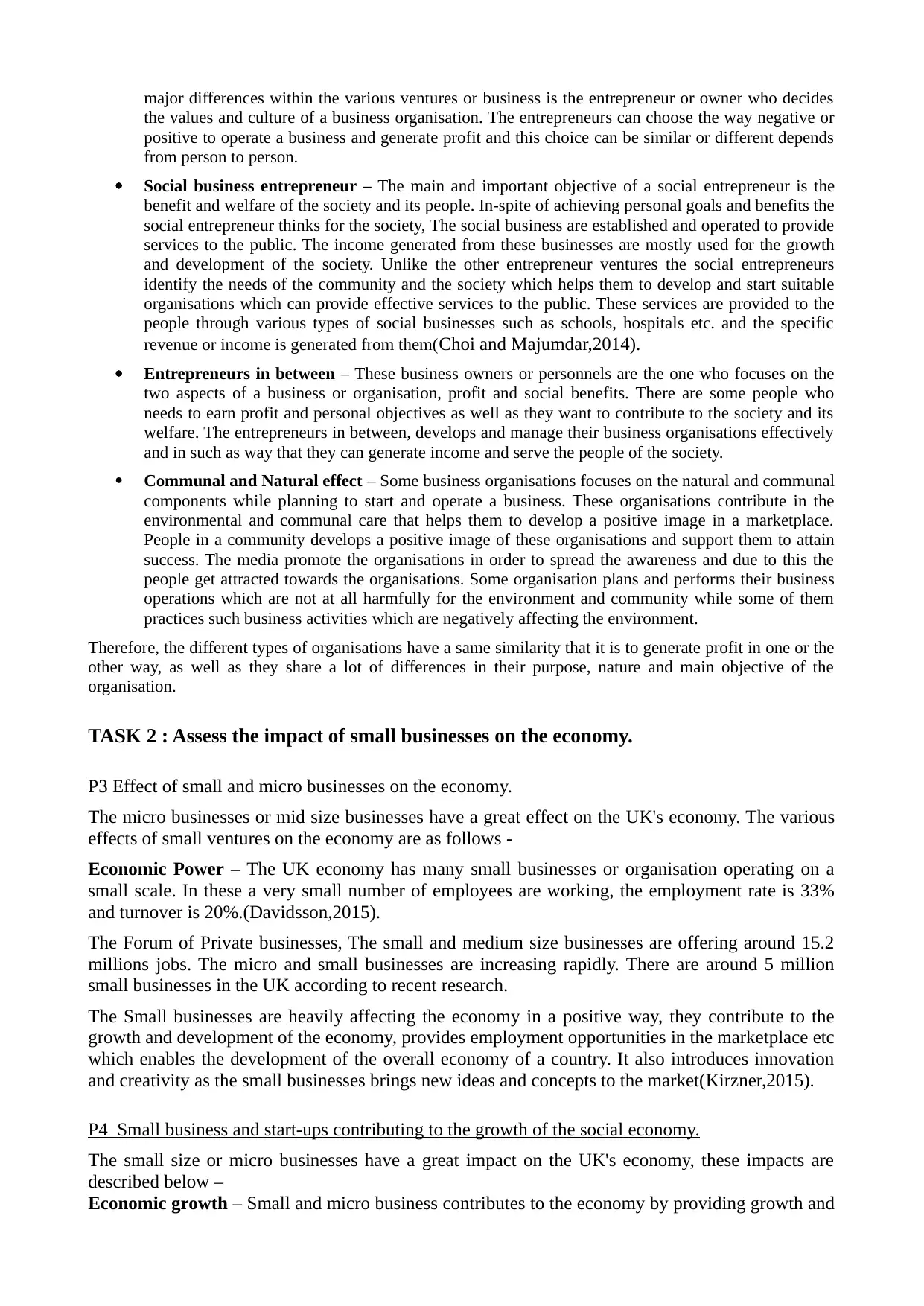
major differences within the various ventures or business is the entrepreneur or owner who decides
the values and culture of a business organisation. The entrepreneurs can choose the way negative or
positive to operate a business and generate profit and this choice can be similar or different depends
from person to person.
Social business entrepreneur – The main and important objective of a social entrepreneur is the
benefit and welfare of the society and its people. In-spite of achieving personal goals and benefits the
social entrepreneur thinks for the society, The social business are established and operated to provide
services to the public. The income generated from these businesses are mostly used for the growth
and development of the society. Unlike the other entrepreneur ventures the social entrepreneurs
identify the needs of the community and the society which helps them to develop and start suitable
organisations which can provide effective services to the public. These services are provided to the
people through various types of social businesses such as schools, hospitals etc. and the specific
revenue or income is generated from them(Choi and Majumdar,2014).
Entrepreneurs in between – These business owners or personnels are the one who focuses on the
two aspects of a business or organisation, profit and social benefits. There are some people who
needs to earn profit and personal objectives as well as they want to contribute to the society and its
welfare. The entrepreneurs in between, develops and manage their business organisations effectively
and in such as way that they can generate income and serve the people of the society.
Communal and Natural effect – Some business organisations focuses on the natural and communal
components while planning to start and operate a business. These organisations contribute in the
environmental and communal care that helps them to develop a positive image in a marketplace.
People in a community develops a positive image of these organisations and support them to attain
success. The media promote the organisations in order to spread the awareness and due to this the
people get attracted towards the organisations. Some organisation plans and performs their business
operations which are not at all harmfully for the environment and community while some of them
practices such business activities which are negatively affecting the environment.
Therefore, the different types of organisations have a same similarity that it is to generate profit in one or the
other way, as well as they share a lot of differences in their purpose, nature and main objective of the
organisation.
TASK 2 : Assess the impact of small businesses on the economy.
P3 Effect of small and micro businesses on the economy.
The micro businesses or mid size businesses have a great effect on the UK's economy. The various
effects of small ventures on the economy are as follows -
Economic Power – The UK economy has many small businesses or organisation operating on a
small scale. In these a very small number of employees are working, the employment rate is 33%
and turnover is 20%.(Davidsson,2015).
The Forum of Private businesses, The small and medium size businesses are offering around 15.2
millions jobs. The micro and small businesses are increasing rapidly. There are around 5 million
small businesses in the UK according to recent research.
The Small businesses are heavily affecting the economy in a positive way, they contribute to the
growth and development of the economy, provides employment opportunities in the marketplace etc
which enables the development of the overall economy of a country. It also introduces innovation
and creativity as the small businesses brings new ideas and concepts to the market(Kirzner,2015).
P4 Small business and start-ups contributing to the growth of the social economy.
The small size or micro businesses have a great impact on the UK's economy, these impacts are
described below –
Economic growth – Small and micro business contributes to the economy by providing growth and
the values and culture of a business organisation. The entrepreneurs can choose the way negative or
positive to operate a business and generate profit and this choice can be similar or different depends
from person to person.
Social business entrepreneur – The main and important objective of a social entrepreneur is the
benefit and welfare of the society and its people. In-spite of achieving personal goals and benefits the
social entrepreneur thinks for the society, The social business are established and operated to provide
services to the public. The income generated from these businesses are mostly used for the growth
and development of the society. Unlike the other entrepreneur ventures the social entrepreneurs
identify the needs of the community and the society which helps them to develop and start suitable
organisations which can provide effective services to the public. These services are provided to the
people through various types of social businesses such as schools, hospitals etc. and the specific
revenue or income is generated from them(Choi and Majumdar,2014).
Entrepreneurs in between – These business owners or personnels are the one who focuses on the
two aspects of a business or organisation, profit and social benefits. There are some people who
needs to earn profit and personal objectives as well as they want to contribute to the society and its
welfare. The entrepreneurs in between, develops and manage their business organisations effectively
and in such as way that they can generate income and serve the people of the society.
Communal and Natural effect – Some business organisations focuses on the natural and communal
components while planning to start and operate a business. These organisations contribute in the
environmental and communal care that helps them to develop a positive image in a marketplace.
People in a community develops a positive image of these organisations and support them to attain
success. The media promote the organisations in order to spread the awareness and due to this the
people get attracted towards the organisations. Some organisation plans and performs their business
operations which are not at all harmfully for the environment and community while some of them
practices such business activities which are negatively affecting the environment.
Therefore, the different types of organisations have a same similarity that it is to generate profit in one or the
other way, as well as they share a lot of differences in their purpose, nature and main objective of the
organisation.
TASK 2 : Assess the impact of small businesses on the economy.
P3 Effect of small and micro businesses on the economy.
The micro businesses or mid size businesses have a great effect on the UK's economy. The various
effects of small ventures on the economy are as follows -
Economic Power – The UK economy has many small businesses or organisation operating on a
small scale. In these a very small number of employees are working, the employment rate is 33%
and turnover is 20%.(Davidsson,2015).
The Forum of Private businesses, The small and medium size businesses are offering around 15.2
millions jobs. The micro and small businesses are increasing rapidly. There are around 5 million
small businesses in the UK according to recent research.
The Small businesses are heavily affecting the economy in a positive way, they contribute to the
growth and development of the economy, provides employment opportunities in the marketplace etc
which enables the development of the overall economy of a country. It also introduces innovation
and creativity as the small businesses brings new ideas and concepts to the market(Kirzner,2015).
P4 Small business and start-ups contributing to the growth of the social economy.
The small size or micro businesses have a great impact on the UK's economy, these impacts are
described below –
Economic growth – Small and micro business contributes to the economy by providing growth and
Paraphrase This Document
Need a fresh take? Get an instant paraphrase of this document with our AI Paraphraser
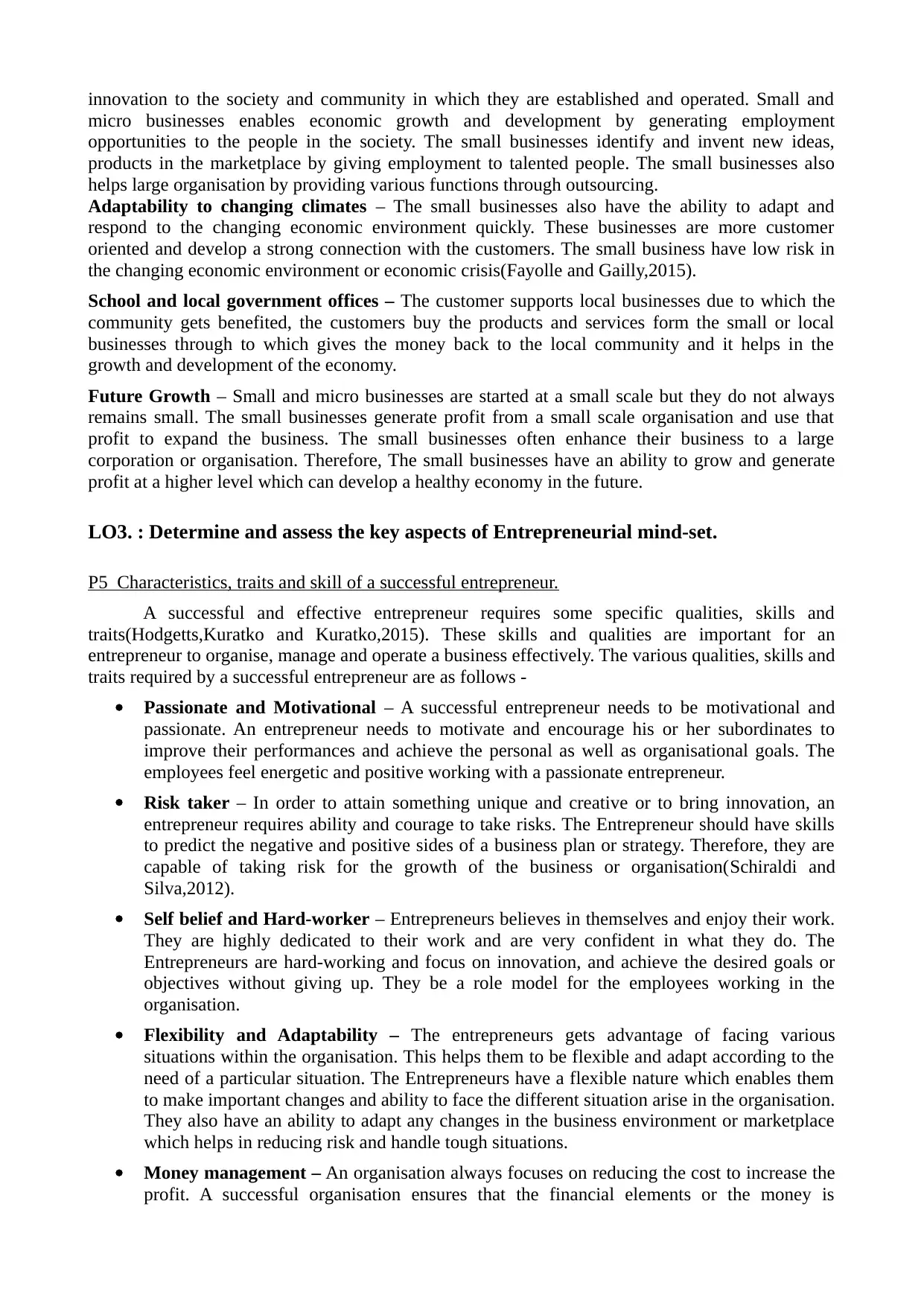
innovation to the society and community in which they are established and operated. Small and
micro businesses enables economic growth and development by generating employment
opportunities to the people in the society. The small businesses identify and invent new ideas,
products in the marketplace by giving employment to talented people. The small businesses also
helps large organisation by providing various functions through outsourcing.
Adaptability to changing climates – The small businesses also have the ability to adapt and
respond to the changing economic environment quickly. These businesses are more customer
oriented and develop a strong connection with the customers. The small business have low risk in
the changing economic environment or economic crisis(Fayolle and Gailly,2015).
School and local government offices – The customer supports local businesses due to which the
community gets benefited, the customers buy the products and services form the small or local
businesses through to which gives the money back to the local community and it helps in the
growth and development of the economy.
Future Growth – Small and micro businesses are started at a small scale but they do not always
remains small. The small businesses generate profit from a small scale organisation and use that
profit to expand the business. The small businesses often enhance their business to a large
corporation or organisation. Therefore, The small businesses have an ability to grow and generate
profit at a higher level which can develop a healthy economy in the future.
LO3. : Determine and assess the key aspects of Entrepreneurial mind-set.
P5 Characteristics, traits and skill of a successful entrepreneur.
A successful and effective entrepreneur requires some specific qualities, skills and
traits(Hodgetts,Kuratko and Kuratko,2015). These skills and qualities are important for an
entrepreneur to organise, manage and operate a business effectively. The various qualities, skills and
traits required by a successful entrepreneur are as follows -
Passionate and Motivational – A successful entrepreneur needs to be motivational and
passionate. An entrepreneur needs to motivate and encourage his or her subordinates to
improve their performances and achieve the personal as well as organisational goals. The
employees feel energetic and positive working with a passionate entrepreneur.
Risk taker – In order to attain something unique and creative or to bring innovation, an
entrepreneur requires ability and courage to take risks. The Entrepreneur should have skills
to predict the negative and positive sides of a business plan or strategy. Therefore, they are
capable of taking risk for the growth of the business or organisation(Schiraldi and
Silva,2012).
Self belief and Hard-worker – Entrepreneurs believes in themselves and enjoy their work.
They are highly dedicated to their work and are very confident in what they do. The
Entrepreneurs are hard-working and focus on innovation, and achieve the desired goals or
objectives without giving up. They be a role model for the employees working in the
organisation.
Flexibility and Adaptability – The entrepreneurs gets advantage of facing various
situations within the organisation. This helps them to be flexible and adapt according to the
need of a particular situation. The Entrepreneurs have a flexible nature which enables them
to make important changes and ability to face the different situation arise in the organisation.
They also have an ability to adapt any changes in the business environment or marketplace
which helps in reducing risk and handle tough situations.
Money management – An organisation always focuses on reducing the cost to increase the
profit. A successful organisation ensures that the financial elements or the money is
micro businesses enables economic growth and development by generating employment
opportunities to the people in the society. The small businesses identify and invent new ideas,
products in the marketplace by giving employment to talented people. The small businesses also
helps large organisation by providing various functions through outsourcing.
Adaptability to changing climates – The small businesses also have the ability to adapt and
respond to the changing economic environment quickly. These businesses are more customer
oriented and develop a strong connection with the customers. The small business have low risk in
the changing economic environment or economic crisis(Fayolle and Gailly,2015).
School and local government offices – The customer supports local businesses due to which the
community gets benefited, the customers buy the products and services form the small or local
businesses through to which gives the money back to the local community and it helps in the
growth and development of the economy.
Future Growth – Small and micro businesses are started at a small scale but they do not always
remains small. The small businesses generate profit from a small scale organisation and use that
profit to expand the business. The small businesses often enhance their business to a large
corporation or organisation. Therefore, The small businesses have an ability to grow and generate
profit at a higher level which can develop a healthy economy in the future.
LO3. : Determine and assess the key aspects of Entrepreneurial mind-set.
P5 Characteristics, traits and skill of a successful entrepreneur.
A successful and effective entrepreneur requires some specific qualities, skills and
traits(Hodgetts,Kuratko and Kuratko,2015). These skills and qualities are important for an
entrepreneur to organise, manage and operate a business effectively. The various qualities, skills and
traits required by a successful entrepreneur are as follows -
Passionate and Motivational – A successful entrepreneur needs to be motivational and
passionate. An entrepreneur needs to motivate and encourage his or her subordinates to
improve their performances and achieve the personal as well as organisational goals. The
employees feel energetic and positive working with a passionate entrepreneur.
Risk taker – In order to attain something unique and creative or to bring innovation, an
entrepreneur requires ability and courage to take risks. The Entrepreneur should have skills
to predict the negative and positive sides of a business plan or strategy. Therefore, they are
capable of taking risk for the growth of the business or organisation(Schiraldi and
Silva,2012).
Self belief and Hard-worker – Entrepreneurs believes in themselves and enjoy their work.
They are highly dedicated to their work and are very confident in what they do. The
Entrepreneurs are hard-working and focus on innovation, and achieve the desired goals or
objectives without giving up. They be a role model for the employees working in the
organisation.
Flexibility and Adaptability – The entrepreneurs gets advantage of facing various
situations within the organisation. This helps them to be flexible and adapt according to the
need of a particular situation. The Entrepreneurs have a flexible nature which enables them
to make important changes and ability to face the different situation arise in the organisation.
They also have an ability to adapt any changes in the business environment or marketplace
which helps in reducing risk and handle tough situations.
Money management – An organisation always focuses on reducing the cost to increase the
profit. A successful organisation ensures that the financial elements or the money is
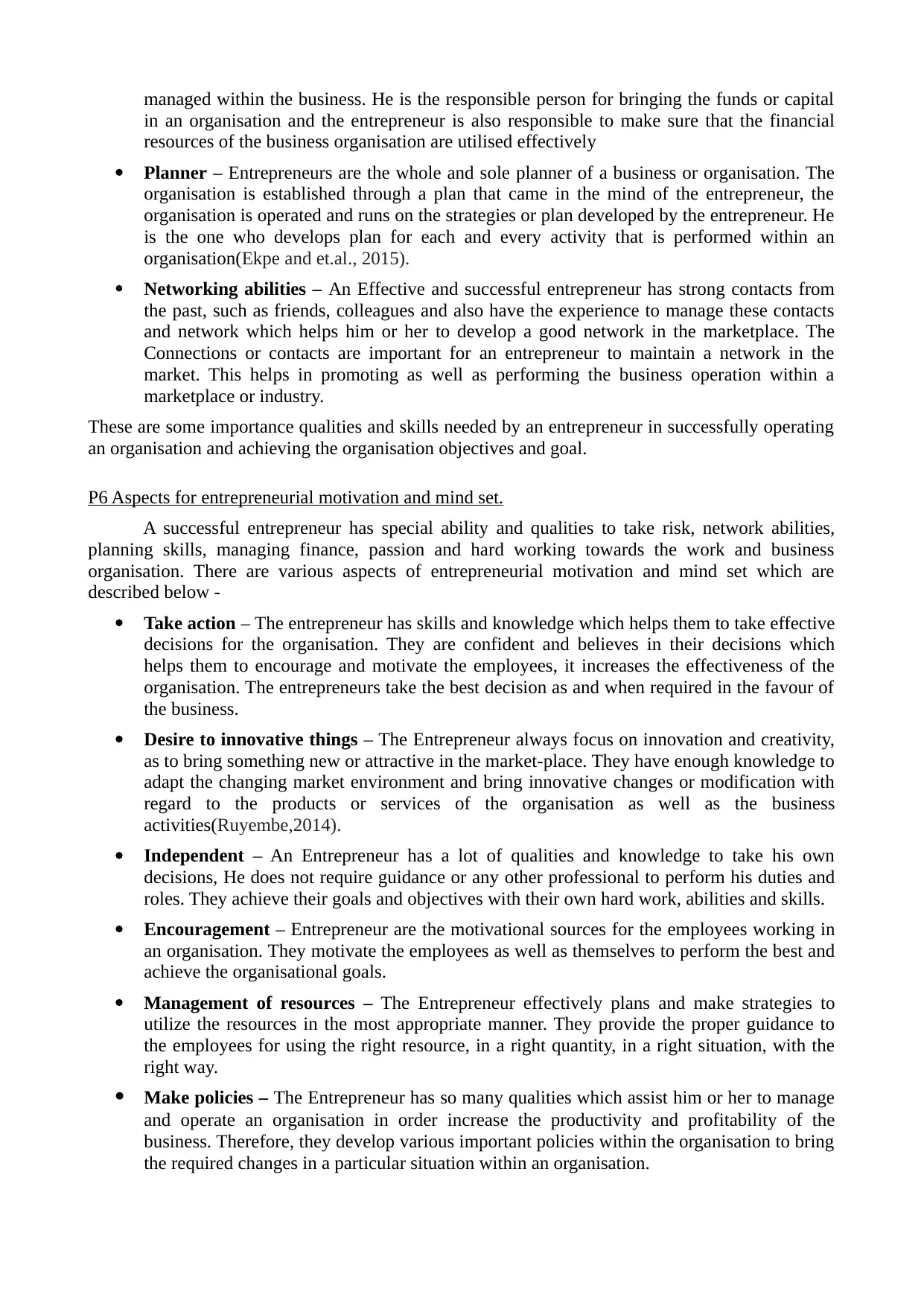
managed within the business. He is the responsible person for bringing the funds or capital
in an organisation and the entrepreneur is also responsible to make sure that the financial
resources of the business organisation are utilised effectively
Planner – Entrepreneurs are the whole and sole planner of a business or organisation. The
organisation is established through a plan that came in the mind of the entrepreneur, the
organisation is operated and runs on the strategies or plan developed by the entrepreneur. He
is the one who develops plan for each and every activity that is performed within an
organisation(Ekpe and et.al., 2015).
Networking abilities – An Effective and successful entrepreneur has strong contacts from
the past, such as friends, colleagues and also have the experience to manage these contacts
and network which helps him or her to develop a good network in the marketplace. The
Connections or contacts are important for an entrepreneur to maintain a network in the
market. This helps in promoting as well as performing the business operation within a
marketplace or industry.
These are some importance qualities and skills needed by an entrepreneur in successfully operating
an organisation and achieving the organisation objectives and goal.
P6 Aspects for entrepreneurial motivation and mind set.
A successful entrepreneur has special ability and qualities to take risk, network abilities,
planning skills, managing finance, passion and hard working towards the work and business
organisation. There are various aspects of entrepreneurial motivation and mind set which are
described below -
Take action – The entrepreneur has skills and knowledge which helps them to take effective
decisions for the organisation. They are confident and believes in their decisions which
helps them to encourage and motivate the employees, it increases the effectiveness of the
organisation. The entrepreneurs take the best decision as and when required in the favour of
the business.
Desire to innovative things – The Entrepreneur always focus on innovation and creativity,
as to bring something new or attractive in the market-place. They have enough knowledge to
adapt the changing market environment and bring innovative changes or modification with
regard to the products or services of the organisation as well as the business
activities(Ruyembe,2014).
Independent – An Entrepreneur has a lot of qualities and knowledge to take his own
decisions, He does not require guidance or any other professional to perform his duties and
roles. They achieve their goals and objectives with their own hard work, abilities and skills.
Encouragement – Entrepreneur are the motivational sources for the employees working in
an organisation. They motivate the employees as well as themselves to perform the best and
achieve the organisational goals.
Management of resources – The Entrepreneur effectively plans and make strategies to
utilize the resources in the most appropriate manner. They provide the proper guidance to
the employees for using the right resource, in a right quantity, in a right situation, with the
right way.
Make policies – The Entrepreneur has so many qualities which assist him or her to manage
and operate an organisation in order increase the productivity and profitability of the
business. Therefore, they develop various important policies within the organisation to bring
the required changes in a particular situation within an organisation.
in an organisation and the entrepreneur is also responsible to make sure that the financial
resources of the business organisation are utilised effectively
Planner – Entrepreneurs are the whole and sole planner of a business or organisation. The
organisation is established through a plan that came in the mind of the entrepreneur, the
organisation is operated and runs on the strategies or plan developed by the entrepreneur. He
is the one who develops plan for each and every activity that is performed within an
organisation(Ekpe and et.al., 2015).
Networking abilities – An Effective and successful entrepreneur has strong contacts from
the past, such as friends, colleagues and also have the experience to manage these contacts
and network which helps him or her to develop a good network in the marketplace. The
Connections or contacts are important for an entrepreneur to maintain a network in the
market. This helps in promoting as well as performing the business operation within a
marketplace or industry.
These are some importance qualities and skills needed by an entrepreneur in successfully operating
an organisation and achieving the organisation objectives and goal.
P6 Aspects for entrepreneurial motivation and mind set.
A successful entrepreneur has special ability and qualities to take risk, network abilities,
planning skills, managing finance, passion and hard working towards the work and business
organisation. There are various aspects of entrepreneurial motivation and mind set which are
described below -
Take action – The entrepreneur has skills and knowledge which helps them to take effective
decisions for the organisation. They are confident and believes in their decisions which
helps them to encourage and motivate the employees, it increases the effectiveness of the
organisation. The entrepreneurs take the best decision as and when required in the favour of
the business.
Desire to innovative things – The Entrepreneur always focus on innovation and creativity,
as to bring something new or attractive in the market-place. They have enough knowledge to
adapt the changing market environment and bring innovative changes or modification with
regard to the products or services of the organisation as well as the business
activities(Ruyembe,2014).
Independent – An Entrepreneur has a lot of qualities and knowledge to take his own
decisions, He does not require guidance or any other professional to perform his duties and
roles. They achieve their goals and objectives with their own hard work, abilities and skills.
Encouragement – Entrepreneur are the motivational sources for the employees working in
an organisation. They motivate the employees as well as themselves to perform the best and
achieve the organisational goals.
Management of resources – The Entrepreneur effectively plans and make strategies to
utilize the resources in the most appropriate manner. They provide the proper guidance to
the employees for using the right resource, in a right quantity, in a right situation, with the
right way.
Make policies – The Entrepreneur has so many qualities which assist him or her to manage
and operate an organisation in order increase the productivity and profitability of the
business. Therefore, they develop various important policies within the organisation to bring
the required changes in a particular situation within an organisation.
⊘ This is a preview!⊘
Do you want full access?
Subscribe today to unlock all pages.

Trusted by 1+ million students worldwide
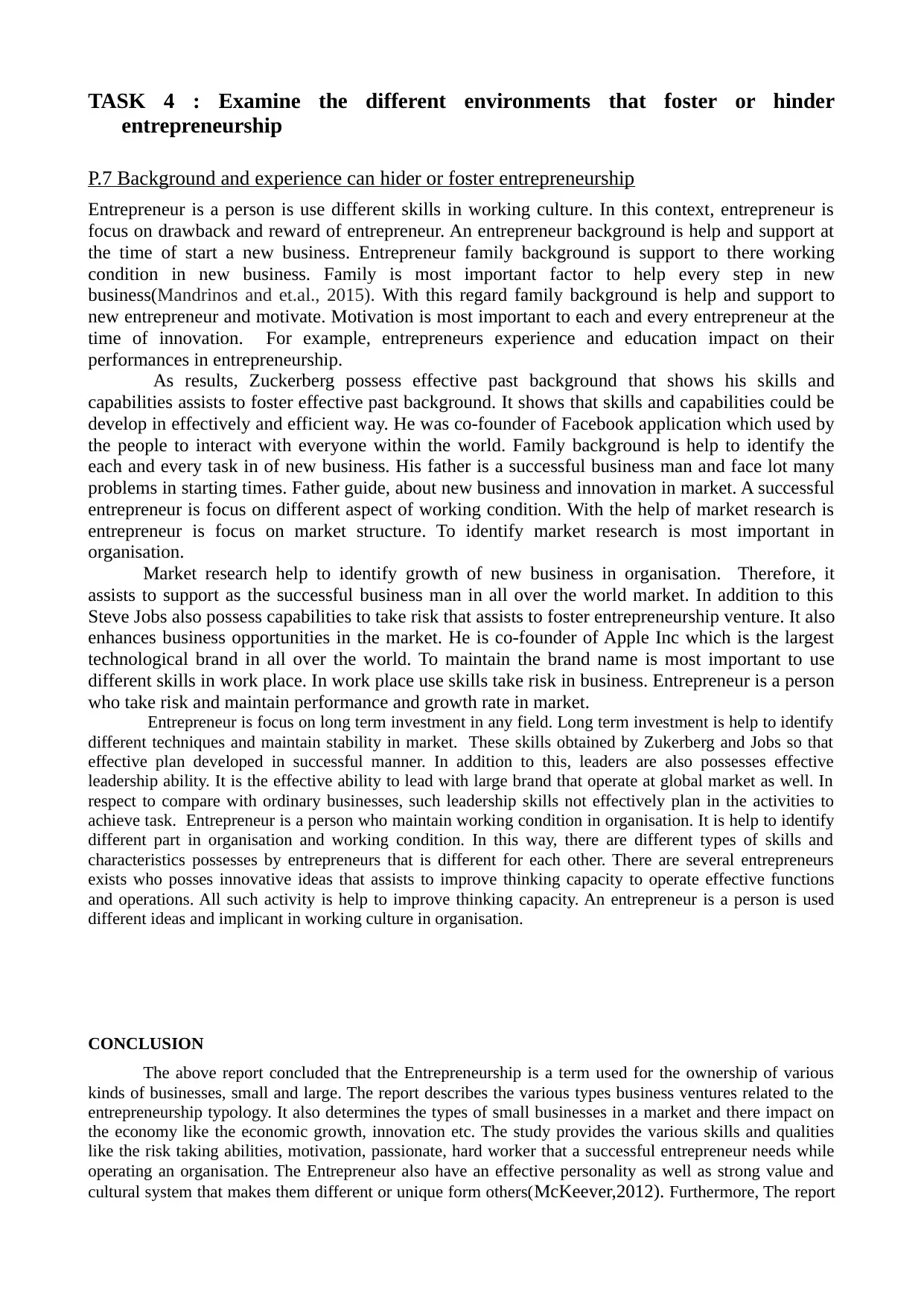
TASK 4 : Examine the different environments that foster or hinder
entrepreneurship
P.7 Background and experience can hider or foster entrepreneurship
Entrepreneur is a person is use different skills in working culture. In this context, entrepreneur is
focus on drawback and reward of entrepreneur. An entrepreneur background is help and support at
the time of start a new business. Entrepreneur family background is support to there working
condition in new business. Family is most important factor to help every step in new
business(Mandrinos and et.al., 2015). With this regard family background is help and support to
new entrepreneur and motivate. Motivation is most important to each and every entrepreneur at the
time of innovation. For example, entrepreneurs experience and education impact on their
performances in entrepreneurship.
As results, Zuckerberg possess effective past background that shows his skills and
capabilities assists to foster effective past background. It shows that skills and capabilities could be
develop in effectively and efficient way. He was co-founder of Facebook application which used by
the people to interact with everyone within the world. Family background is help to identify the
each and every task in of new business. His father is a successful business man and face lot many
problems in starting times. Father guide, about new business and innovation in market. A successful
entrepreneur is focus on different aspect of working condition. With the help of market research is
entrepreneur is focus on market structure. To identify market research is most important in
organisation.
Market research help to identify growth of new business in organisation. Therefore, it
assists to support as the successful business man in all over the world market. In addition to this
Steve Jobs also possess capabilities to take risk that assists to foster entrepreneurship venture. It also
enhances business opportunities in the market. He is co-founder of Apple Inc which is the largest
technological brand in all over the world. To maintain the brand name is most important to use
different skills in work place. In work place use skills take risk in business. Entrepreneur is a person
who take risk and maintain performance and growth rate in market.
Entrepreneur is focus on long term investment in any field. Long term investment is help to identify
different techniques and maintain stability in market. These skills obtained by Zukerberg and Jobs so that
effective plan developed in successful manner. In addition to this, leaders are also possesses effective
leadership ability. It is the effective ability to lead with large brand that operate at global market as well. In
respect to compare with ordinary businesses, such leadership skills not effectively plan in the activities to
achieve task. Entrepreneur is a person who maintain working condition in organisation. It is help to identify
different part in organisation and working condition. In this way, there are different types of skills and
characteristics possesses by entrepreneurs that is different for each other. There are several entrepreneurs
exists who posses innovative ideas that assists to improve thinking capacity to operate effective functions
and operations. All such activity is help to improve thinking capacity. An entrepreneur is a person is used
different ideas and implicant in working culture in organisation.
CONCLUSION
The above report concluded that the Entrepreneurship is a term used for the ownership of various
kinds of businesses, small and large. The report describes the various types business ventures related to the
entrepreneurship typology. It also determines the types of small businesses in a market and there impact on
the economy like the economic growth, innovation etc. The study provides the various skills and qualities
like the risk taking abilities, motivation, passionate, hard worker that a successful entrepreneur needs while
operating an organisation. The Entrepreneur also have an effective personality as well as strong value and
cultural system that makes them different or unique form others(McKeever,2012). Furthermore, The report
entrepreneurship
P.7 Background and experience can hider or foster entrepreneurship
Entrepreneur is a person is use different skills in working culture. In this context, entrepreneur is
focus on drawback and reward of entrepreneur. An entrepreneur background is help and support at
the time of start a new business. Entrepreneur family background is support to there working
condition in new business. Family is most important factor to help every step in new
business(Mandrinos and et.al., 2015). With this regard family background is help and support to
new entrepreneur and motivate. Motivation is most important to each and every entrepreneur at the
time of innovation. For example, entrepreneurs experience and education impact on their
performances in entrepreneurship.
As results, Zuckerberg possess effective past background that shows his skills and
capabilities assists to foster effective past background. It shows that skills and capabilities could be
develop in effectively and efficient way. He was co-founder of Facebook application which used by
the people to interact with everyone within the world. Family background is help to identify the
each and every task in of new business. His father is a successful business man and face lot many
problems in starting times. Father guide, about new business and innovation in market. A successful
entrepreneur is focus on different aspect of working condition. With the help of market research is
entrepreneur is focus on market structure. To identify market research is most important in
organisation.
Market research help to identify growth of new business in organisation. Therefore, it
assists to support as the successful business man in all over the world market. In addition to this
Steve Jobs also possess capabilities to take risk that assists to foster entrepreneurship venture. It also
enhances business opportunities in the market. He is co-founder of Apple Inc which is the largest
technological brand in all over the world. To maintain the brand name is most important to use
different skills in work place. In work place use skills take risk in business. Entrepreneur is a person
who take risk and maintain performance and growth rate in market.
Entrepreneur is focus on long term investment in any field. Long term investment is help to identify
different techniques and maintain stability in market. These skills obtained by Zukerberg and Jobs so that
effective plan developed in successful manner. In addition to this, leaders are also possesses effective
leadership ability. It is the effective ability to lead with large brand that operate at global market as well. In
respect to compare with ordinary businesses, such leadership skills not effectively plan in the activities to
achieve task. Entrepreneur is a person who maintain working condition in organisation. It is help to identify
different part in organisation and working condition. In this way, there are different types of skills and
characteristics possesses by entrepreneurs that is different for each other. There are several entrepreneurs
exists who posses innovative ideas that assists to improve thinking capacity to operate effective functions
and operations. All such activity is help to improve thinking capacity. An entrepreneur is a person is used
different ideas and implicant in working culture in organisation.
CONCLUSION
The above report concluded that the Entrepreneurship is a term used for the ownership of various
kinds of businesses, small and large. The report describes the various types business ventures related to the
entrepreneurship typology. It also determines the types of small businesses in a market and there impact on
the economy like the economic growth, innovation etc. The study provides the various skills and qualities
like the risk taking abilities, motivation, passionate, hard worker that a successful entrepreneur needs while
operating an organisation. The Entrepreneur also have an effective personality as well as strong value and
cultural system that makes them different or unique form others(McKeever,2012). Furthermore, The report
Paraphrase This Document
Need a fresh take? Get an instant paraphrase of this document with our AI Paraphraser

includes the way in which the experience and background affect the entrepreneurship. These two are
significant elements that plays essential roles in developing as well as improving the entrepreneurship
qualities.
significant elements that plays essential roles in developing as well as improving the entrepreneurship
qualities.
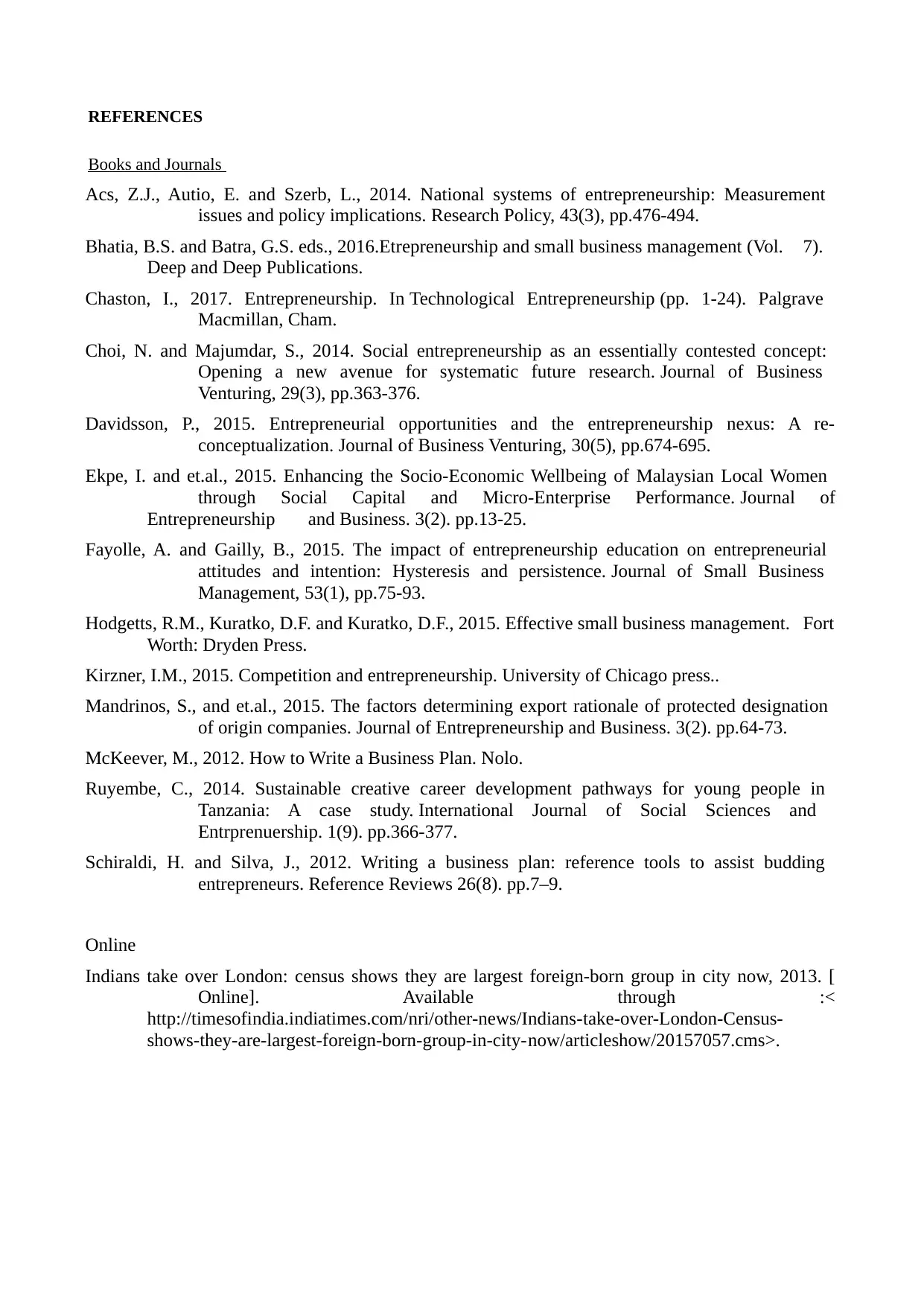
REFERENCES
Books and Journals
Acs, Z.J., Autio, E. and Szerb, L., 2014. National systems of entrepreneurship: Measurement
issues and policy implications. Research Policy, 43(3), pp.476-494.
Bhatia, B.S. and Batra, G.S. eds., 2016.Etrepreneurship and small business management (Vol. 7).
Deep and Deep Publications.
Chaston, I., 2017. Entrepreneurship. In Technological Entrepreneurship (pp. 1-24). Palgrave
Macmillan, Cham.
Choi, N. and Majumdar, S., 2014. Social entrepreneurship as an essentially contested concept:
Opening a new avenue for systematic future research. Journal of Business
Venturing, 29(3), pp.363-376.
Davidsson, P., 2015. Entrepreneurial opportunities and the entrepreneurship nexus: A re-
conceptualization. Journal of Business Venturing, 30(5), pp.674-695.
Ekpe, I. and et.al., 2015. Enhancing the Socio-Economic Wellbeing of Malaysian Local Women
through Social Capital and Micro-Enterprise Performance. Journal of
Entrepreneurship and Business. 3(2). pp.13-25.
Fayolle, A. and Gailly, B., 2015. The impact of entrepreneurship education on entrepreneurial
attitudes and intention: Hysteresis and persistence. Journal of Small Business
Management, 53(1), pp.75-93.
Hodgetts, R.M., Kuratko, D.F. and Kuratko, D.F., 2015. Effective small business management. Fort
Worth: Dryden Press.
Kirzner, I.M., 2015. Competition and entrepreneurship. University of Chicago press..
Mandrinos, S., and et.al., 2015. The factors determining export rationale of protected designation
of origin companies. Journal of Entrepreneurship and Business. 3(2). pp.64-73.
McKeever, M., 2012. How to Write a Business Plan. Nolo.
Ruyembe, C., 2014. Sustainable creative career development pathways for young people in
Tanzania: A case study. International Journal of Social Sciences and
Entrprenuership. 1(9). pp.366-377.
Schiraldi, H. and Silva, J., 2012. Writing a business plan: reference tools to assist budding
entrepreneurs. Reference Reviews 26(8). pp.7–9.
Online
Indians take over London: census shows they are largest foreign-born group in city now, 2013. [
Online]. Available through :<
http://timesofindia.indiatimes.com/nri/other-news/Indians-take-over-London-Census-
shows-they-are-largest-foreign-born-group-in-city-now/articleshow/20157057.cms>.
Books and Journals
Acs, Z.J., Autio, E. and Szerb, L., 2014. National systems of entrepreneurship: Measurement
issues and policy implications. Research Policy, 43(3), pp.476-494.
Bhatia, B.S. and Batra, G.S. eds., 2016.Etrepreneurship and small business management (Vol. 7).
Deep and Deep Publications.
Chaston, I., 2017. Entrepreneurship. In Technological Entrepreneurship (pp. 1-24). Palgrave
Macmillan, Cham.
Choi, N. and Majumdar, S., 2014. Social entrepreneurship as an essentially contested concept:
Opening a new avenue for systematic future research. Journal of Business
Venturing, 29(3), pp.363-376.
Davidsson, P., 2015. Entrepreneurial opportunities and the entrepreneurship nexus: A re-
conceptualization. Journal of Business Venturing, 30(5), pp.674-695.
Ekpe, I. and et.al., 2015. Enhancing the Socio-Economic Wellbeing of Malaysian Local Women
through Social Capital and Micro-Enterprise Performance. Journal of
Entrepreneurship and Business. 3(2). pp.13-25.
Fayolle, A. and Gailly, B., 2015. The impact of entrepreneurship education on entrepreneurial
attitudes and intention: Hysteresis and persistence. Journal of Small Business
Management, 53(1), pp.75-93.
Hodgetts, R.M., Kuratko, D.F. and Kuratko, D.F., 2015. Effective small business management. Fort
Worth: Dryden Press.
Kirzner, I.M., 2015. Competition and entrepreneurship. University of Chicago press..
Mandrinos, S., and et.al., 2015. The factors determining export rationale of protected designation
of origin companies. Journal of Entrepreneurship and Business. 3(2). pp.64-73.
McKeever, M., 2012. How to Write a Business Plan. Nolo.
Ruyembe, C., 2014. Sustainable creative career development pathways for young people in
Tanzania: A case study. International Journal of Social Sciences and
Entrprenuership. 1(9). pp.366-377.
Schiraldi, H. and Silva, J., 2012. Writing a business plan: reference tools to assist budding
entrepreneurs. Reference Reviews 26(8). pp.7–9.
Online
Indians take over London: census shows they are largest foreign-born group in city now, 2013. [
Online]. Available through :<
http://timesofindia.indiatimes.com/nri/other-news/Indians-take-over-London-Census-
shows-they-are-largest-foreign-born-group-in-city-now/articleshow/20157057.cms>.
⊘ This is a preview!⊘
Do you want full access?
Subscribe today to unlock all pages.

Trusted by 1+ million students worldwide
1 out of 9
Related Documents
Your All-in-One AI-Powered Toolkit for Academic Success.
+13062052269
info@desklib.com
Available 24*7 on WhatsApp / Email
![[object Object]](/_next/static/media/star-bottom.7253800d.svg)
Unlock your academic potential
Copyright © 2020–2026 A2Z Services. All Rights Reserved. Developed and managed by ZUCOL.




